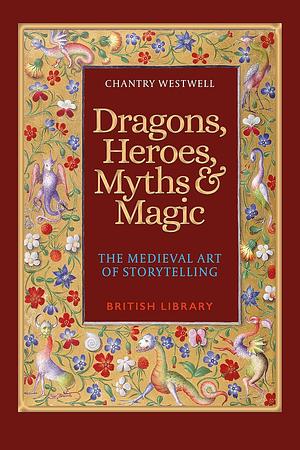
Dragons, Heroes, Myths & Magic: The Medieval Art of Storytelling
by Chantry Westwell
Genres: History, Non-fictionPages: 384
Rating:

Synopsis:Journey through magical fairy tales, chivalric adventures, mystical events and celebrated foundation myths.
Trace how folk traditions and the manners of courtly love have developed through generations and across continents and how the most celebrated of ancient stories have become even more fantastical with age.
Chantry Westwell has used her profound knowledge of the Library’s illuminated manuscript collections to explore some of literature’s most enduring and multi-layered stories, together with the deep history of the books and chronicles in which they were first preserved. These powerful tales are presented alongside some of the most exquisite examples of art to survive from the eighth to the sixteenth centuries as medieval artists responded to the inspiring storylines with their own works of supreme beauty.
Chantry Westwell’s Dragons, Heroes, Myths and Magic is all about medieval manuscripts, and specifically their illustrations and illuminations. It focuses on how they were used to illustrate stories, and each chapter explains and attempts to contextualise the famous stories.
It’s unfortunate that Westwell presents some things as fact which I know to be merely theory (such as the origin of the word grail, and linking it with certainty to “Celtic” antecedents), and for some reason actually states as fact that the Arthurian legends are based around a real historical person (of which there is simply not one shred of proof). It would be hard to be an expert on all the different stories included in the manuscripts discussed here, and possibly Westwell should’ve stayed in her lane if she wasn’t sure — or, if these are her opinions, then she should have presented them as such. So, read with caution.
It’s also notable (and gross) that she privileges English sources over Welsh ones, listing Geoffrey of Monmouth and Thomas Malory ahead of ‘Culhwch ac Olwen’ — you could be forgiven for thinking that the Welsh tales came later, since she mentions them after a bunch of English ones, and gives them only a single paragraph.
That’d be all very well if she were merely confining her remarks to the illuminations, but of course she isn’t. Given that I cannot evaluate her level of knowledge on all of these topics, it’s difficult to know if I can recommend this book. The fact that it’s clearly for “laypeople” (so to speak) doesn’t excuse it; I don’t consider that a reason to be sloppy. Still, it’s a beautifully presented book, with full-colour illustrations, and makes for a lovely object.
Rating: 3/5
